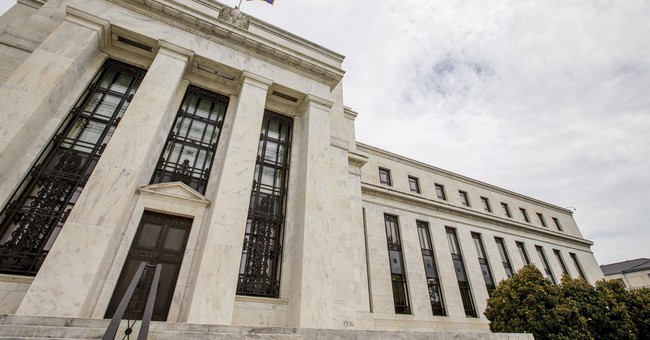
Source: AP Photo/Andrew Harnik
Harvard economist Greg Mankiw thought President Trump’s nominations of Herbert Cain and Stephen Moore to the Federal Reserve Board would sully the reputation of his mistress. Sounding like a teenage girl with a crush, or sportscasters talking about their favorite running back, Mankiw wrote a gushing love letter to the Federal Reserve for the New York Times:
I have a confession to make: I love the Federal Reserve. And I suspect that, in their heart of hearts, most other economists love the Federal Reserve, too. But I fear our love may be in peril...
At this point, you might be saying: “Whoa, Nelly! Have you already forgotten the financial crisis and Great Recession?”
No, I have not. As I wrote just last year, the Fed’s decision not to rescue Lehman Brothers when the investment bank faced a liquidity shortfall in September 2008 was arguably an unforced error. And though we’ll never know for sure, subsequent events might have been less tragic if the Fed had acted more boldly.
Institutions, like people, should not be judged by the standard of perfection. They should be judged by whether they are doing the best they can. By this standard, I give the Fed a top grade.
(Mankiw assures us he isn’t a teenage girl by using the sports term, “unforced error,” a mistake in play that is attributed to one's own failure rather than to the skill or effort of one's opponent.)
Mankiw’s standard of “doing the best they can” sets the bar very low. No one judges uses such a standard even in the fantasy world of academia. Parents judge their own children by that standard until they reach an age of accountability. But does Mankiw pass out grades on that basis? If so, that explains a lot of what’s wrong with a college education today.
The Fed hasn’t performed well by the standards of most people, even economists. A Bank of England paper Reform of the International Monetary and Financial Systemmakes this point well. The system it criticizes is the central bank system of which the Fed is the US model:
Against a range of metrics, today’s system has performed poorly, at least relative to the BWS [Bretton Woods System]...the current system has coexisted, on average, with: slower, more volatile, global growth; more frequent economic downturns; higher inflation and inflation volatility; larger current account imbalances; and more frequent banking crises, currency crises and external defaults...the incidence of banking and currency crises has been higher in the current IMFS than in any previous regime, with the incidence of sovereign default second only to the interwar period...
The incidence rate of banking and currency crises in the Gold Standard was much lower than in today’s system...The direction of net capital flows during the Gold Standard seemed broadly consistent with the efficient allocation of capital across countries. In particular, these imbalances were associated with ‘downhill’ flows of capital from the older, advanced economies in Europe to more productive opportunities in the younger, fast-growing economies in Asia and the Americas...Overall, the Gold Standard appeared to perform reasonably well against its financial stability and allocative efficiency objectives, while the internal balance objective was of secondary importance.Anyone who understands economic history knows that the financial crises of the 19thcentury were short and mild compared to those created by the Fed after 1913. The Great Recession that began in 2008, and the combined recessions of 1981-82, were almost as deep as the Great Depression, all of which happened under the Fed’s reign. No crisis in the 19th century was as deep as those three or lasted as long as the Great Depression. And most of the 19th century crises resulted from state interference in the economy, not bank actions.
The financial crises that the Fed generates are bad enough. Less visible to economists, but equally damaging, are the Cantillon effects of Fed policy, named after the first economist to discover them, Richard Cantillon. Cantillon observed centuries ago that when banks create new money by expanding credit, the people who get the new money first buy assets, such as real estate, stocks and bonds, before their prices rise. Then they can sell those assets to the suckers who get the money last, usually the middle class, after prices have risen. Cantillon made his fortune that way in the Mississippi Bubble of 1720. Cantillon effects redistribute wealth from the middle class to the wealthy, and from poorer to wealthier nations, worsening inequality and keeping groups of people in poverty.
The Fed is so ugly an institution that only a mother could love it. The Bank of England blames high unemployment for the death of the Gold Standard, but in reality bankers formed the Fed in order to bail each other out with government money when they loaned out too much of their customers’ money. So why should mainstream economists sing the love-sick blues over it? Because it gives them a feeling of control. Economic professors don’t make as much money as Wall Street bankers with lesser degrees. The Fed compensates them by making them feel that they control the world through the it.
Hayek wrote, “The curious task of economics is to demonstrate to men how little they really know about what they imagine they can design.” Mankiw, as all mainstream economists, failed that lesson.
No comments:
Post a Comment